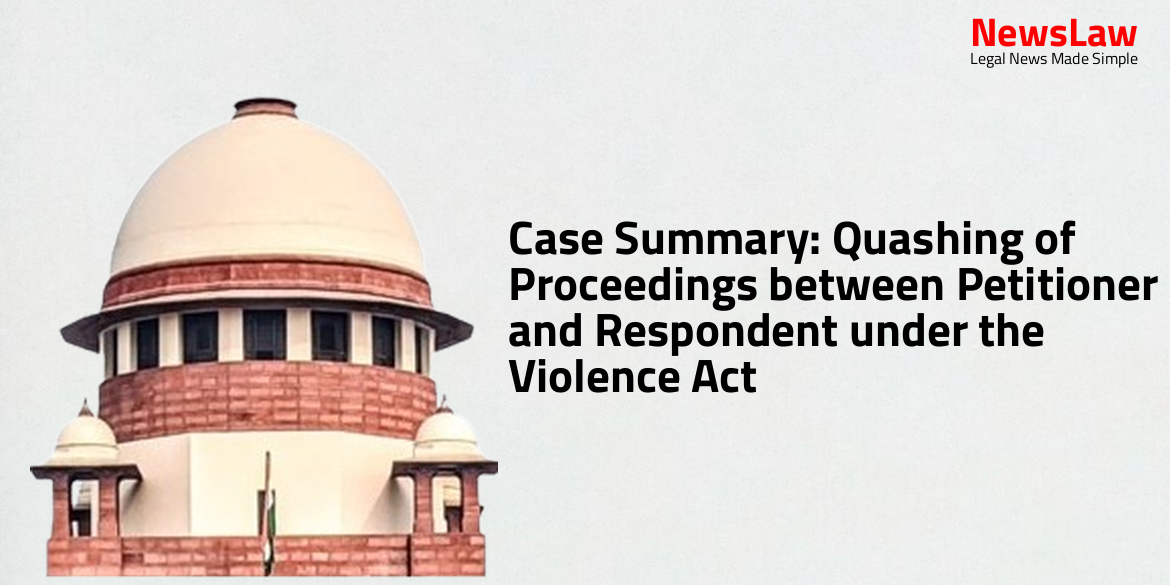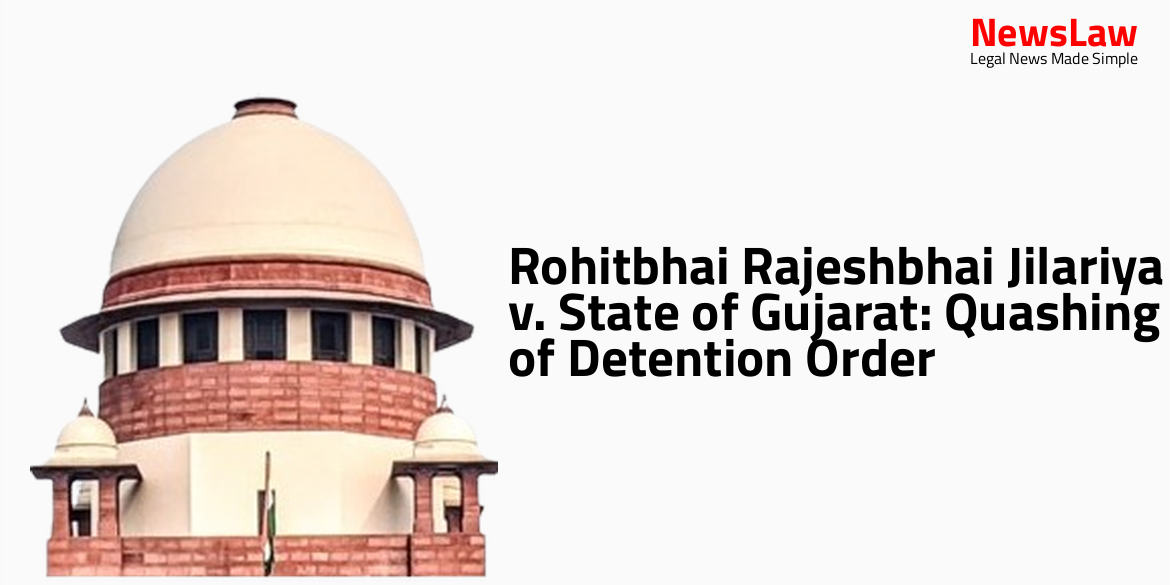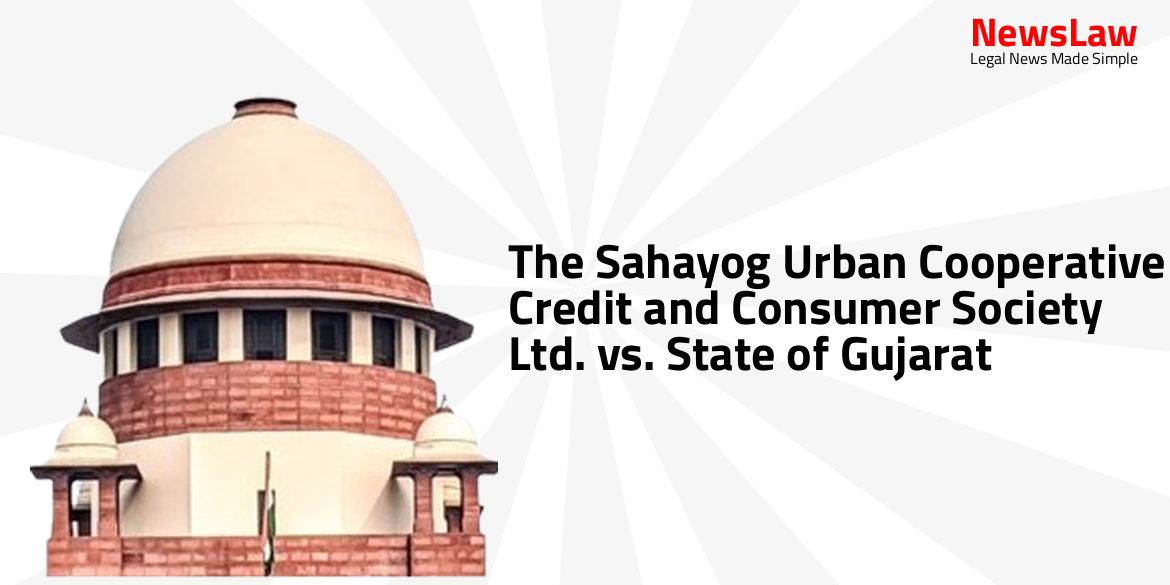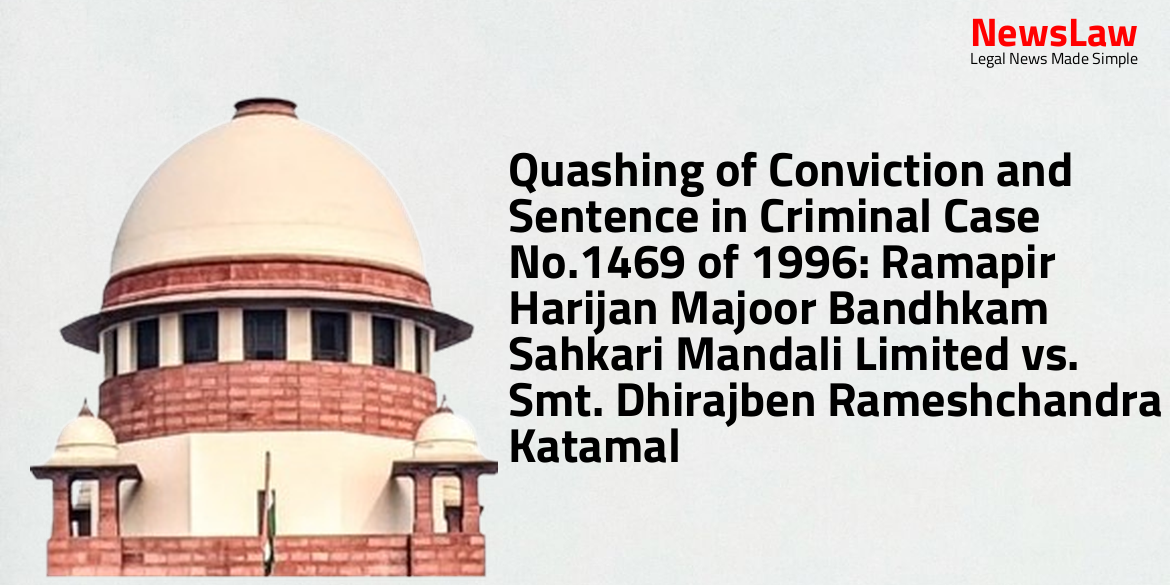In a significant legal development, the Gujarat High Court has addressed the quashing of proceedings between the petitioner and respondent under the Violence Act. This case highlights the importance of fair legal processes in matrimonial disputes, where the parties had previously executed agreements and a divorce deed. The court’s ruling emphasizes the need for specific allegations and prevents the misuse of legal provisions. Stay informed on this case for insights into the judicial system’s approach to domestic violence issues.
Facts
- The marriage between the petitioner (Original Name) and the respondent (Original Name) was dissolved on 28.02.2010 through a written agreement.
- In the agreement, the petitioner agreed to pay permanent alimony to the respondent and their daughters, with the condition that the respondent would not file any criminal or civil proceedings. Custody of the minor daughters was also discussed.
- On 09.11.2012, a divorce deed was executed where the petitioner agreed to transfer his house to the respondent and their daughters as part of the permanent maintenance agreement.
- The petitioner transferred his house to the respondent and minor daughters through a registered sale deed dated 20.11.2012.
- Despite the agreements, the respondent filed for maintenance under Section 125 of CrPC and also a complaint under the Violence Act.
- The family court granted interim maintenance for the minor daughters but rejected the maintenance claim by the respondent.
- A settlement was reached between the parties later, with the petitioner issuing a cheque to the respondent.
- The summon issued by the Magistrate led to the filing of the present petition for quashing the proceedings.
- Efforts by family members to resolve disputes between the couple were unsuccessful.
Arguments
- Petitioner and Respondent got married, separated, and executed agreements and divorce deed
- Petitioner transferred own house to Respondent as per understanding
- Petitioner already paid Rs. 11,00,000 to Respondent
- Impugned complaint filed by Respondent is seen as abuse of process of law
- Petitioner’s relatives joined as accused in the complaint to pressurize Petitioner
- State of Gujarat opposes the quashing of the complaint
- Learned advocates for both parties presented their arguments regarding the quashing of proceedings initiated by the wife under the Violence Act against the husband and his relatives.
- The main question for consideration is whether the said proceedings should be quashed.
- The affidavit in reply filed by the respondent no.2 contains all the facts of the case as per learned advocate’s submission.
- The respondent no.2’s advocate opposed the application, stating that the petitioners had harassed the respondent which led to the filing of the impugned complaint.
- The learned Magistrate issued process after considering the allegations in the complaint, indicating that the court should not interfere with the ongoing proceedings.
Analysis
- The court analyzed the allegations in the FIR and found that they were vague and did not specifically constitute the offense under the Violence Act.
- The complaint lacked basic facts necessary for making out an offense under the Penal Code.
- It was noted that the petitioners had already fulfilled their obligations by making payments and providing accommodation to the respondent.
- The court emphasized the importance of the complaint containing the necessary ingredients for an offense on its face.
- The inherent jurisdiction of the court under Section 482 of the Code was discussed, stating that it should be used sparingly and with caution.
- The Supreme Court’s view on exercising extraordinary power was highlighted, emphasizing the need to prevent injustice.
- The court’s role in examining whether the allegations in a complaint constitute the necessary ingredients for an offense was discussed.
- The principle that criminal proceedings can be quashed if the allegations do not disclose the commission of an offense was reiterated.
- The court found that the marriage between the petitioner and respondent had disputes leading to an agreement and divorce deed.
- The impugned complaint sought accommodation, maintenance, and other expenses, with an alleged over implication of the petitioner’s relatives.
- It was emphasized that the High Court’s inherent powers are meant for real and substantial justice and to prevent abuse of court processes.
- The court concluded that the petition deserved to be allowed without evaluating the merits of the allegations.
- The Magistrate may, on being satisfied that domestic violence has taken place, pass a residence order to protect the aggrieved person.
- The residence order can include directions such as restraining the respondent from dispossessing or disturbing the possession of the aggrieved person, directing the respondent to remove himself from the shared household, and restraining the respondent from alienating the shared household.
- The Magistrate may also pass orders for the respondent to provide alternate accommodation or pay rent for the aggrieved person.
- Such orders are deemed to be under the Code of Criminal Procedure and can involve police protection for the aggrieved person.
- The Magistrate may impose obligations on the respondent concerning financial needs and resources of the parties.
- Interim and ex parte orders can be granted if domestic violence is evident or likely, including monetary relief for losses and maintenance for the aggrieved person and her children.
- The monetary relief granted should be fair and reasonable to maintain the standard of living of the aggrieved person.
- Failure to pay the monetary relief may lead to directions for direct payment from the respondent’s wages or salaries.
- Custody orders may be given to protect the aggrieved person or any child, including conditions or directions deemed necessary by the Magistrate.
- Protection orders can be passed to prevent the respondent from committing acts of domestic violence or contacting the aggrieved person.
- Compensation orders may be granted for injuries, including mental torture and emotional distress, caused by domestic violence.
- Courts are expected to adopt a cautious approach in matters of quashing, especially in cases of matrimonial disputes.
- There have been instances where women have misused legal provisions to harass their husbands and in-laws for personal vendettas.
- The misuse of legal provisions can be a lethal weapon against men for extortion and harassment.
- The judgment in Geeta Mehrotra & Ors. Vs. State of U.P & Ors. emphasizes the need for specific allegations against accused, especially in cases of matrimonial bickering, to justify sending them for trial.
- Sending named accused for trial without specific allegations would be an abuse of legal and judicial process.
- High Courts and the Apex Court have abrogated misuse of law by some women through remarkable judgments
- Courts differentiate between vulnerable women and those with dubious characters
- Continuation of proceedings against the petitioners is considered a gross abuse and misuse of law
- Petitioner fulfilled obligations by making payments and providing accommodation as agreed
- Impugned complaint filed against petitioners with oblique motive despite fulfilling obligations
- Settlement reached under Section 125 of CrPC with supporting documents on record
Decision
- Direct service is permitted as per the court ruling.
- The rule made under the Protection of Women against Domestic Violence Act, 2005, is quashed and set aside.
- The petition is allowed, and all consequential proceedings are terminated.
- The impugned complaint/proceedings in Criminal Misc. Application No.1792/2014 are quashed.
Case Title: PRAGNESHBHAI KIRITBHAI PARMAR Vs. STATE OF GUJARAT
Case Number: R/SCR.A/7485/2015



